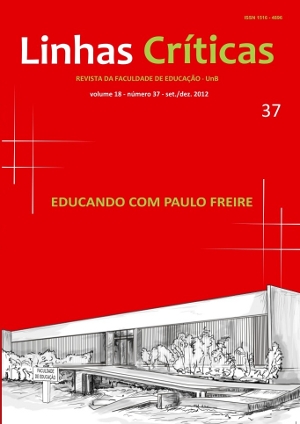Narratives as an analytical category of school evaluation
DOI:
https://doi.org/10.26512/lc.v18i37.4022Keywords:
Evaluation, Teaching, Learning, Language-evaluationAbstract
In this study we discuss evaluation practices in the field of language studies. In the first part, we show the limits of traditional evaluating practices, centered in a conception of language as structure and of evaluation as measurement. In the second one, we show some ideas of the author upon whose thought we based our new concept of evaluation; Walter Benjamin, specifically in the book Magic and technique, art and politics – essays on literature and culture history. In the third part, we show how the teaching process can be understood as a narrative and the teacher as a narrator, in the perspective of evaluation as discursive action, at the service of the learning process and the quality of education.
Downloads
References
BAKHTIN, Mikhail. Marxismo e filosofia da linguagem. 3. ed., São Paulo: Hucitec, 1986.
BATISTA, Antônio Augusto Gomes. Aula de português ”“ discurso e saberes escolares. São Paulo: Martins Fontes, 1997.
BENJAMIN, Walter. Magia e técnica, arte e política ”“ ensaios sobre literatura e história da cultura. 7. ed., São Paulo: Brasiliense, 1995.
DEACON, Roger e PARKER, Ben. Educação como sujeição e como recusa. In: SILVA, Tomás Tadeu (org.). O sujeito da educação ”“ estudos foucaultianos. 3. ed., Petrópolis: Vozes, 1994, p. 97-110.
ESTEBAN, Maria Teresa. A avaliação no cotidiano escolar. In:_______. (Org.). Avaliação: uma prática em busca de novos sentidos. 2. ed., Rio de Janeiro: DP & A, 2000, p. 7-28.
GERALDI, João Wanderley. Discurso e sujeito. In: Linguagem e ensino ”“ exercícios de militância e divulgação. Campinas: ALB / Mercado de Letras, 1996, p. 9-23.
_______. Escrita, uso da escrita e avaliação. In: GERALDI, João Wanderley. (Org.). O texto na sala de aula. São Paulo: Ática, 1997, p. 127-131.
_______. Portos de passagem. 3. ed., São Paulo: Martins Fontes, 1995.
JESUS, Conceição Aparecida de. Reescrita: para além da higienização. 1995. Dissertação (Mestrado em Linguística) ”“ Programa de Pós-graduação em Linguística. Universidade Estadual de Campinas/ Instituto de Estudos da Linguagem. 1995.
LARROSA, Jorge. Pedagogia profana: danças, piruetas e mascaradas. 3. ed., Belo Horizonte: Autêntica, 2000.
MAINGUENEAU, Dominique. Novas tendências em análise do discurso. 3. ed., Campinas: Pontes / Ed. da UNICAMP, 1997.
ORLANDI, Eni de Lourdes Puccinelli. A leitura proposta e os leitores possíveis. In:________. (Org.). A leitura e os leitores. Campinas: Pontes, 1998a, p. 7-24.
_______. Discurso e leitura. São Paulo: Cortez; Campinas: Editora da UNICAMP, 1988.
_______. Identidade linguística escolar. In: SIGNORINI, Inês. (Org.). Língua(gem) e identidade ”“ elementos para uma discussão no campo aplicado. Campinas: Mercado de Letras; São Paulo, FAPESP, 1998b, p. 203-212.
PFEIFFER, Cláudia. Que autor é este? 1995. Dissertação (Mestrado em Linguística). Programa de Pós-graduação em Linguística. Universidade Estadual de Campinas/Instituto de Estudos da Linguagem, 1995.
SARMENTO, Diva Chaves. (Coord.). O discurso e a prática da avaliação na escola. Campinas: Pontes; Juiz de Fora: EDUFJF, 1997.
SUASSUNA, Lívia. A teoria sociointeracionista de Mikhail Bakhtin e suas implicações para a avaliação educacional. In: Ensaios de pedagogia da língua portuguesa. Recife, Ed. da UFPE, 2006, p. 205-220.
________. Ensino de língua portuguesa ”“ uma abordagem pragmática. Campinas: Papirus, 1995.
________. Linguagem como discurso ”“ implicações para as práticas de avaliação. 2004. Tese (Doutorado em Linguística). Programa de Pós-graduação em Linguística. Universidade Estadual de Campinas, Instituto de Estudos da Linguagem. 2004.
VEIGA-NETO, Alfredo José da. Foucault e a educação: outros estudos foucaultianos. In: SILVA, Tomás Tadeu (org.). O sujeito da educação: estudos foucaultianos. 3. ed., Petrópolis: Vozes, 1994, p. 225-246.
Downloads
Published
How to Cite
Issue
Section
License
Copyright (c) 2016 Linhas Críticas

This work is licensed under a Creative Commons Attribution 4.0 International License.
Authors who publish in this journal agree to the following terms:
-Authors maintains the copyright and grants the journal the right of first publication, the work being simultaneously licensed under the Creative Commons Attribution License which allows the sharing of the work with recognition of the authorship of the work and initial publication in this journal.
- Authors are authorized to enter into additional contracts separately, for non-exclusive distribution of the version of the work published in this journal (eg publish in institutional repository or as a book chapter), with acknowledgment of authorship and initial publication in this journal.
-Authorers are allowed and encouraged to publish and distribute their work online (eg in institutional repositories or on their personal page) at any point before or during the editorial process, as this can generate productive changes as well as increase the impact and the citation of published work (See The Effect of Free Access).



